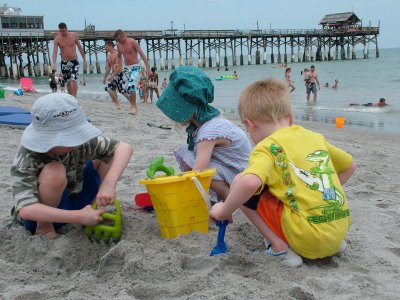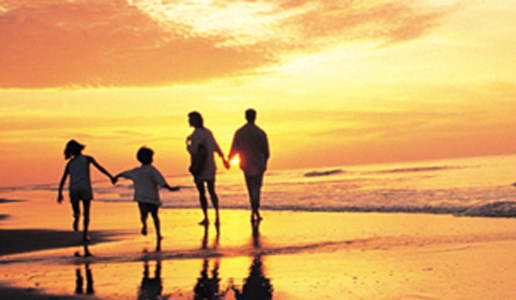As I wrote in a previous blog, I am Korean-American. Although I have lived in this country for many, many years and consider myself "well-assimilated," some cultural lessons I have taken from my very Korean parents will never be forgotten.
One of these lessons is that I still do not like to be out in the sun. It has been rather difficult to reconcile this culture of sun avoidance with the American lifestyle of sun worship. It was hard living in sunny Southern California as a teenager, and it has been hard living in the coastal region of North Carolina as an adult where the sun is superabundant and it is searingly hot during the summer months. You just cannot avoid being out in the sun in these parts of the country unless you just didn't go out at all during the day.
My dislike of the sun is actually the result of a combination of both the Korean cultural upbringing and the photosensitivity I suffered as a child. When I spent any time in the sun, my skin would get raw and scaly and stay that way for the entire summer. Sunscreens had not been invented yet, and I was forced to wear hats and use umbrellas. They didn't invite glares from other people, however, since fair complexion is prized in Korea and women often use them in the sun. When we wanted to swim, we would start in the morning, then take a break during midday over watermelon, and then swim again in the late afternoon. I can't remember swimming when the sun was beating down on us.
Now the American sun culture is completely different. When we go to the beach, for example, it is impossible to find parking during the day. The local pools are filled with children at mid-day and clear out at about 4:00pm. I routinely see children playing and splashing around in the water in the searing sun. The only thought in my mind is, "what's wrong with these fair-skinned people? They are baking in the sun!"
My American husband has had to learn to adapt to my attitude toward the sun, so my family always goes to the beach or the pool after 4:00pm. But this decision was not hard to make for both me and my husband, for my younger child was born with the same photosensitivity as I was. My child seems to have built up more immunity now, but from about when he was 2 until just this year, we did not dare take him outside on a sunny day without a thick coat of sunscreen of at least SPF 60 on him. Starting in March and until September, we would religiously apply sunscreen on him.
When I found out how sensitive my child was to the sun, I researched about the dangers of sun exposure. Here are the facts about the sun and skin cancer according to Skin Cancer Foundation:
* Skin cancer is the most common form of cancer in the United States. More than one million skin cancers are diagnosed annually. Even one childhood sunburn doubles the risk of skin cancer later in life.
* Each year there are more new cases of skin cancer than the combined incidence of cancers of the breast, prostate, lung and colon.
* One in five Americans will develop skin cancer in the course of a lifetime.
* Basal cell carcinoma is the most common form of skin cancer; about one million of the cases diagnosed annually are basal cell carcinomas. Basal cell carcinomas are rarely fatal, but can be highly disfiguring.
* Squamous cell carcinoma is the second most common form of skin cancer. More than 250,000 cases are diagnosed each year, resulting in approximately 2,500 deaths.
* Basal cell carcinoma and squamous cell carcinoma are the two major forms of non-melanoma skin cancer. Between 40 and 50 percent of Americans who live to age 65 will have either skin cancer at least once.
* In 2004, the total direct cost associated with the treatment for non-melanoma skin cancers was more than $1 billion.
* About 90 percent of non-melanoma skin cancers are associated with exposure to ultraviolet (UV) radiation from the sun.
* Up to 90 percent of the visible changes commonly attributed to aging are caused by the sun.
* Contrary to popular belief, 80 percent of a person's lifetime sun exposure is not acquired before age 18; only about 23 percent of lifetime exposure occurs by age 18.
Both Skin Cancer Foundation and American Cancer Society have produced clear guidelines for preventing sunburns and sun damage that lead to skin cancer. Some are just simple commonsense.
* Avoid the sun between 10:00am and 4:00pm when the UV index is the highest.
* Seek shade.
* Use Sunscreen with SPF of at least 15 everyday and higher during the summer.
* Do not burn.
* Cover up with clothing.
* Wear hats.

These are just about all the things that I learned as a Korean child growing up in a Korean household. Except for the sunscreen. We didn't have it.
We do not know what the safe amount of sun exposure is, so we would much rather err on the side of being cautious than not. Needless to say, both my husband and I are now very careful around the sun when it comes to our children. My husband, who has a lot of Italian in him and does not burn, grew up playing in the sun in sunny California and remembers having just lots of fun playing in the sun. I am determined that this idea of baking in the sun will not be a part of my children's childhood memories.
My children will remember their childhood slightly differently: going to the beach after 4:00pm wearing swim shirts, going swimming always well after the sun is no longer hot. But they will still remember having fun. After all, what can be more fun than swimming in the pool and going to the beach? No one says that it has to be at mid day. Children can have lots of water fun any time of the day. My children have come to prefer swimming in the evening, for they always come home refreshed and seem to sleep comfortably throughout the night. I sincerely hope that my children will be thankful to me when they are older and they cannot remember getting sunburned. They will hopefully say, "my mother did all right protecting us from the sun."

Unfortunately, for the librarian at my children's elementary school, a middle-aged redhead, it is too late. Growing up in Florida, she remembers how her mother always took her children outside to play in the water in the summer. She remembers spending all her time in the sun during the summer. Now every few months she goes in for a check-up. Every few years she has surgery to remove a cancerous growth from her body. She told me one time, "my deceased mother would be sad if she knew that making us play outside has caused us so much harm." I decided that that is not what my children would say about me after I am gone.
As much as I love to consider myself well-assimilated, when it comes to sun safety, it is the one cultural divide that I am happy not to bridge.